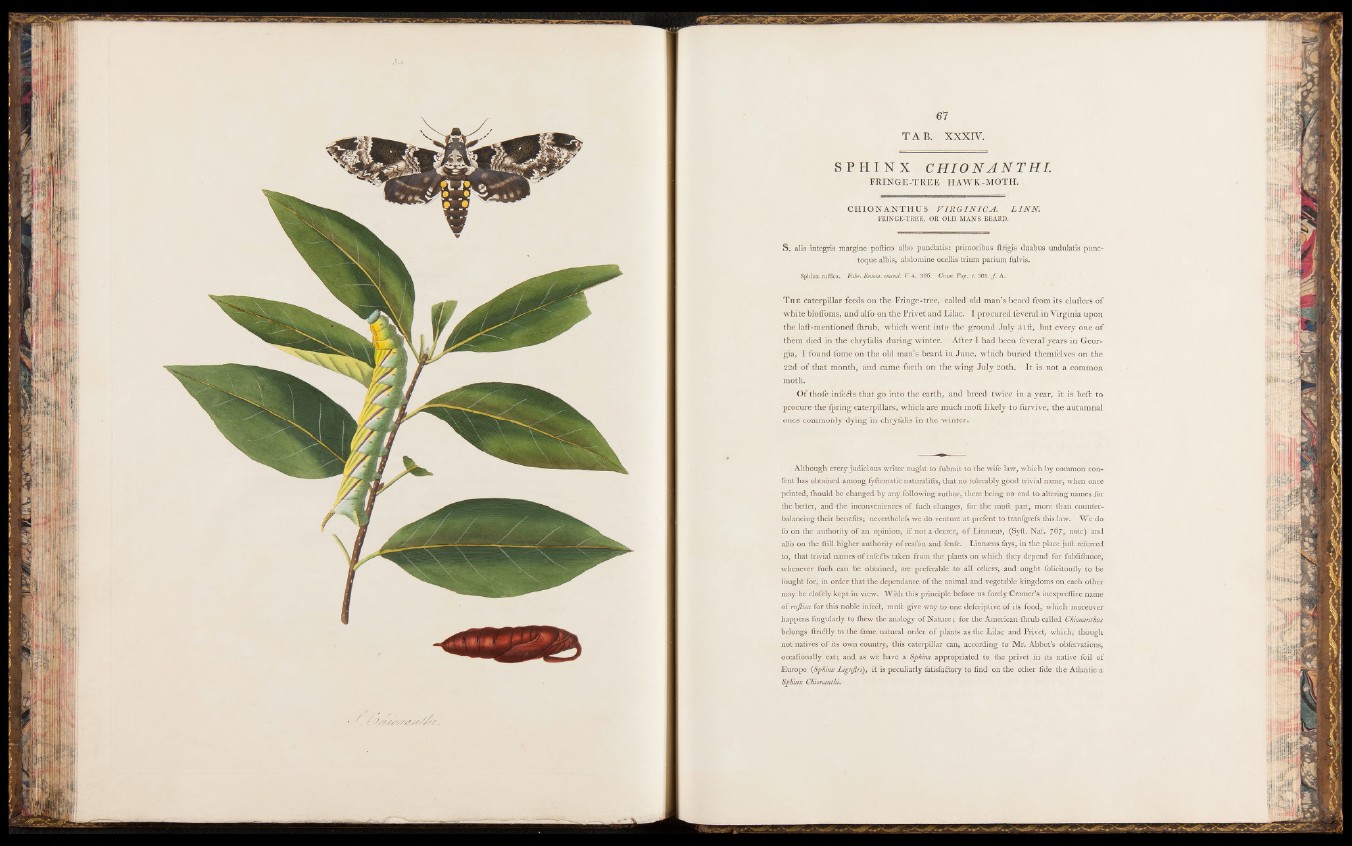
67
TAB. XXXIV.
S P H I N X C H I O N A N T H L
F R IN G E -T R E E H A W K -M O T H .
G H IO N A N T H U S V IR G IN IC A . L IN N .
FRINGE-TREE, OR OLD MAN’S BEARD.
S . alis integris margine poftico albo pundtatis: primoribus ftrigis duabus undulatis punc-
toque albis, abdomine ocellis trium parium fulvis.
Sphinx ruftica. Fair. JLntom. cniend. V. 4. 366. Cram. Pap. t. 301. f . A;
T h E caterpillar reeds on th e Fringe-tree, called old man’s beard from its clutters o f
w h ite bloflbms, and alfo on th e P rivet and Lilac. I procured feveral in Virginia upon'
th e latt-mentioned thrub, which w e n t into the ground Ju ly 31 ft, b u t every one o f
them died in th e chrytalis during winter. After I had been feveral years in Georgia,
I found fome on the old man’s beard in June, wh ich buried themfelves on the
22d o f th a t month, and came fo rth on th e w in g Ju ly 20th. I t is n o t a common
moth.
O f thofe infects th a t go into th e earth, and breed twice in a year, it is beft to
procure the fpring caterpillars, which are much m oft likely to furvive, th e autumnal
ones commonly dying in chryfalis in the winter.
Although every judicious writer ought to fubmit to the wife law, which by common con-
fent has obtained among fyftematic naturalifts, that no tolerably good trivial name, when once
printed, fliould be changed by any following author, there being no end to altering names for
the better, and the inconveniences of fuch changes, for the moft part, more than counterbalancing
their benefits; neverthelefs we do venture at prefent to tranfgrefs this law. We do
fo on the authority of an opinion, if not a decree, of Linnasus, (Syft. Nat. 767, note) and
alfo on the ftill higher authority of reafon and fenfe. Linnaeus fays, in the place juft referred
to, that trivial names of infects taken from the plants on which they depend for fubfiftancé,
whenever fuch can be obtained, are preferable to all others, and ought folicitoufly to be
fought for, in order that the dependance of the animal and vegetable kingdoms on each other
may be clofely kept in view. With this principle before us furely Cramer’s inexpreffive name
of ruftica for this noble imfeét, muft give way to one defcriptive of its food, which moreover
happens Angularly to fhew the analogy of Nature; for the American lhrub called Chionanthus
belongs ftridtly to the fame natural order of plants as the Lilac and Privet, which, though
not natives of its own country, this caterpillar can, according to Mr. Abbot’s obfervations,
occalionally eat; and as we have a Sphinx appropriated to the privet in its native foil of
Europe (Sphinx Ligujlri), it is peculiarly fatisfadtory to find on the other fide the Atlantic a
Sphinx Chionanthi.